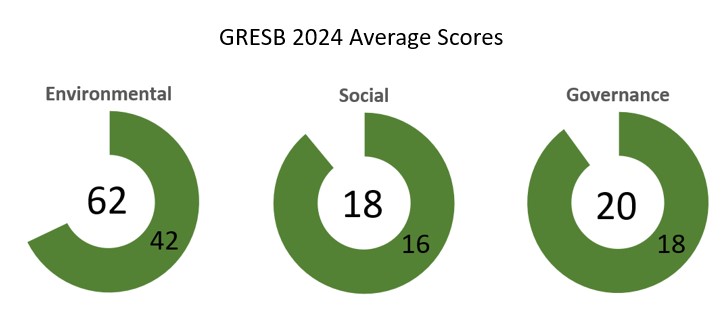Address
608, 105 Stirling Street, Perth,
Western Australia 6000
Phone
+61 461 410 031

In an era where sustainability and transparency are paramount, the Global Real Estate Sustainability Benchmark (GRESB) has emerged as a critical standard for evaluating the Environmental, Social, and Governance (ESG) performance of real estate assets and portfolios. While all three ESG pillars hold intrinsic value, the environmental component – specially building emission, energy, water, waste, and indoor environment performances – plays an outsized role in achieving high GRESB scores and star ratings.
The latest 2024 GRESB assessment results show that most Real Estate Investment Trusts (REITs) achieve near perfect scores for Social (average 16/18) and Governance (average 18/20) components, indicating the best strategy to reach to 5 Star GRESB rating is to improve on the building performance component (2024 average 42/62).

Environmental Metrics: A Quantifiable Path to Sustainability
GRESB’s scoring framework places significant weight on environmental factors such as energy consumption, water use, waste management, and greenhouse gas (GHG) emissions. These elements are not only measurable but also directly impact the operational efficiency of buildings and portfolios. Achieving optimal performance in these areas demonstrates a tangible commitment to sustainability and climate action, which aligns with global goals like the Paris Agreement and the United Nations’ Sustainable Development Goals (SDGs).
High performing buildings – those with reduced energy consumption, efficient water usage, minimal waste generation, and lower emissions – contribute significantly to GRESB scores. For example, energy efficiency retrofits and renewable energy adoption not only reduce carbon footprints but also lower operational costs, creating a win-win for both sustainability and profitability. Additionally, well-documented performance data allows asset managers to showcase their achievements in environmental stewardship, further boosting their GRESB scores.
The Competitive Edge of Building Efficiency
Organisations and asset portfolio owners aiming for high GRESB ratings must recognise the outsized influence of building performance. With climate regulations tightening and investors demanding greater transparency, focusing on energy, water, waste, and emissions efficiency offers a competitive edge. Here’s why:
Achieving high GRESB scores requires a strategic focus on measurable, impactful metrics, with building energy, water, waste, and emissions performance taking centre stage. By prioritising efficiency and sustainability in the built environment, organisations not only improve their GRESB ratings but also position themselves as leaders in the global shift toward a greener, more sustainable future. In a world increasingly defined by climate urgency, building performance isn’t just an operational concern—it’s a strategic imperative.
If you’re aiming to enhance your asset portfolio performance, connect with us at Geronimo Advisory. Together, let’s create a brighter, greener future.
